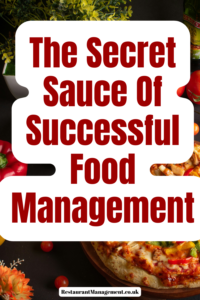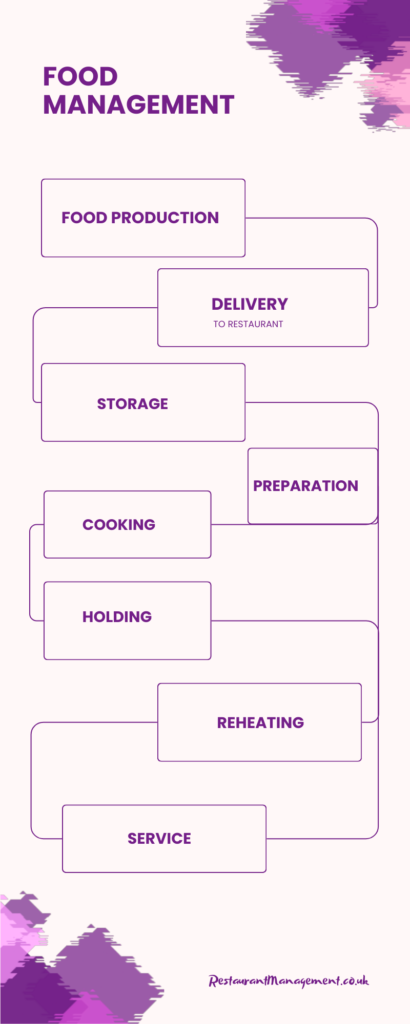Food and Management
In the world of food service, effective food management isn’t merely a luxury; it’s a necessity. From the finest dining establishments to bustling hospital cafeterias, managing resources efficiently while prioritising sustainability is crucial. Picture a well-oiled kitchen machine where ingredients seamlessly transition from delivery to the guest plate, waste minimises, and customer satisfaction soars.
Whether you’re overseeing a bustling restaurant, managing a hotel’s kitchen, or running a cosy coffee shop, optimising food handling isn’t just about efficiency; it’s about shaping a brighter, more sustainable future. That’s the promise of top-tier food management. But how does one achieve it? Join us as we explore the intricate world of food management, uncovering strategies for efficiency, sustainability, and success in any culinary setting.
What is Food Management?
At its core, food management involves systematic planning, organisation, and control of food resources. It goes beyond stocking ingredients; it’s about minimising waste, maximising freshness, and consistently delivering quality meals. Effective food management is essential for operational efficiency and sustainability, from commercial kitchens to household settings. Challenges like fluctuating ingredient costs and evolving dietary trends are prevalent, but success is attainable with the right tools and techniques.
The Role of Food Management in Hospitality Industries
Food management takes on heightened significance in an industry where culinary experiences reign supreme. Restaurants, hotels, and catering services rely on meticulous planning and execution to deliver exceptional dining experiences. Guest satisfaction and loyalty depend on every aspect of restaurant operations, including menu planning and inventory control.

The Basics of Effective Food Management
At the heart of every well-run kitchen lies a set of essential tools and techniques. Robust inventory management systems and rigorous food safety protocols form the backbone of efficient food management. But can technology lend a helping hand? And how do we balance profit demands with the need to protect the planet?
Why You Should Invest in Effective Food Management
The benefits of effective food management are vast. Savings, operational streamlining, enhanced customer experiences, and regulatory compliance are among them. You’ll need the right tools and resources for effective food management. Investing in the proper materials can streamline operations and enhance efficiency, from storage containers and labelling systems to kitchen equipment and inventory management software.
Challenges in Food Management
Despite its importance, food management presents challenges. Fluctuating demand, perishable ingredients, regulatory compliance, and sustainability concerns are obstacles to navigate. Good food management means looking at all the challenges and doing things well.
Understanding Food Management
Food management encompasses a range of activities, including meal planning, inventory management, storage, preparation, and waste reduction. By effectively managing these aspects, you can ensure your kitchen operates smoothly and efficiently.

Meal Planning
Meal planning serves as the cornerstone of efficient food management. When you strategise and plan your meals ahead of time, you have the opportunity to reduce waste, make the most of your ingredients, and simplify the cooking process. Craft a weekly or monthly menu considering various factors, including dietary requirements, seasonal produce, and available resources.
Inventory Management
Accurate inventory is crucial for avoiding shortages, overstocking, and spoilage. Implement a system for tracking ingredients and supplies, whether it’s through manual record-keeping or using digital inventory management software. Regularly monitor inventory levels and reorder items as needed to ensure smooth operations.
Storage Optimisation
Ensuring that ingredients maintain their quality and freshness requires proper storage. The preservation of ingredients is highly dependent on how they are stored. Ensuring the quality of ingredients requires proper storage techniques. Adequate storage plays a pivotal role in maintaining the freshness of ingredients over time. Invest in quality storage containers, shelving units, and refrigeration equipment to maximise space and minimise food waste. Organise your storage areas logically, grouping similar items together and labelling containers clearly for easy identification.
Preparation Efficiency
Streamline your cooking process by optimising your kitchen layout and workflow. Arrange equipment and workstations in a logical sequence to minimise unnecessary movement and maximise productivity. Invest in time-saving tools and appliances, such as food processors, immersion blenders, and multi-functional cookware, to expedite meal preparation.
24 Awesome Strategies For Reducing Restaurant Management Costs
Waste Reduction
Minimising food waste is not only environmentally responsible but also financially beneficial. Implement strategies for reducing waste throughout the food management process, such as portion control, proper food rotation, and creative use of leftovers. Compost organic waste whenever possible to divert it from landfills and promote sustainability.
Implementing Effective Food Management Strategies
Now that we’ve covered the fundamentals of food management, let’s explore some practical tips for implementing these strategies in your kitchen:
- Create a Weekly Meal Plan
Develop a weekly meal plan based on seasonal ingredients, dietary preferences, and available resources. Use this plan to purchase ingredients and prepare meals throughout the week.
- Conduct Regular Inventory Audits
Schedule regular inventory audits to track ingredient usage, identify trends, and prevent shortages or overstocking. Use this data to inform purchasing decisions and optimise inventory levels.
- Optimise Storage Space
Maximise storage space by investing in stackable containers, adjustable shelving units, and space-saving organisers. Keep storage areas clean, dry, and well-ventilated to preserve the quality and freshness of ingredients.
- Streamline Meal Preparation
Organise your kitchen layout to facilitate a smooth workflow, with designated prepping, cooking, and plating areas. Invest in high-quality knives, cutting boards, and other essential tools to expedite meal preparation and minimise downtime.
- Monitor Food Waste
Track food waste metrics, such as spoilage, trimmings, and plate waste, to identify opportunities for improvement. Implement portion control measures, encourage staff training on waste reduction techniques, and explore creative ways to repurpose leftovers.

Optimising Food Management for Efficiency
Can you Reduce Food Waste through Better Management?
One of the most pressing challenges facing the food industry is food waste. Reducing food waste isn’t just eco-friendly; it’s a savvy business move. Strategies like portion control, menu engineering, and donation programs can minimise waste while reducing costs. Data-driven decision-making, aided by analytics and sustainable practices, further enhances efficiency and long-term success.
Whether due to overproduction, improper storage, or consumer habits, vast quantities of food end up in landfills yearly, exacerbating environmental degradation and contributing to global hunger. By adopting strategies, businesses can mitigate food waste, reduce costs and demonstrate their commitment to sustainability.
Cost Savings and Efficiency Gains
At its core, effective food management is a sound investment. Businesses can realise significant cost savings over time by optimising processes, minimising waste, and maximising resource utilisation. Whether through reduced food costs, lower utility bills, or improved labour efficiency, the financial benefits of effective food management are undeniable.
Enhancing Customer Satisfaction
In an era where customer experience reigns supreme, efficient food management can be a powerful differentiator. Businesses can delight customers and foster loyalty by ensuring prompt service, consistent quality, and diverse menu offerings. Whether through personalised recommendations, innovative culinary experiences, or seamless ordering processes, customer satisfaction is understanding and exceeding expectations at every touchpoint.
Meeting Regulatory Requirements
In addition to its financial and operational benefits, effective food management is also a legal imperative. Businesses must navigate a complex compliance landscape from food safety regulations to labelling requirements and licensing obligations to operate legally and ethically. By staying abreast of regulatory changes, investing in training and certification, and implementing robust systems for record-keeping and reporting, businesses can safeguard their reputation and mitigate the risk of costly fines or legal action.
Optimising Food Management In Restaurants: Seize The Opportunity Now!
Harness Big Data for Better Decision Making
In the age of big data, analytics holds immense potential for transforming how we manage food. By harnessing the power of data, businesses can gain insights into customer preferences, track trends, and optimise inventory levels with unprecedented precision. Whether through predictive modelling, demand forecasting, or real-time analytics, data-driven decision-making is revolutionising the food industry, enabling businesses to stay agile and responsive in an ever-evolving market landscape.
Techniques for Inventory Management
Central to effective food management is inventory management. Robust systems for tracking stock levels, monitoring expiry dates, and optimising order quantities minimise waste and ensure freshness. Whether through manual processes or sophisticated software solutions, meticulous inventory management is critical to success.
Ways to Improve Food Management Practices
Continuous improvement is vital in food management. Training staff, streamlining processes, and collaborating with suppliers optimise operations and deliver superior service. Embracing innovation ensures businesses remain ahead of the curve.
Training and Education
Investing in training and education is essential for equipping staff with the knowledge and skills they need to excel in food management roles. Whether through formal training programs, on-the-job mentoring, or continuing education initiatives, empowering employees to understand best practices and stay updated on industry trends is vital to driving performance and maintaining a culture of excellence.
Streamlining Processes
In the fast-paced world of food service, efficiency is paramount. Businesses can streamline their operations by identifying bottlenecks, eliminating redundant tasks, optimising workflows and delivering faster, more responsive service to customers. Whether through reconfiguring kitchen layouts, implementing standardised procedures, or embracing lean principles, there are myriad opportunities to enhance efficiency and drive performance.
Food Safety Protocols in the UK
In the UK, stringent food safety regulations uphold consumer protection and public health standards. Adherence to hygiene practices, temperature control, allergen management, and traceability is non-negotiable for food businesses. Prioritising food safety safeguards consumers and maintains a reputation for responsibility.
Implementing Sustainable Practices
As awareness of environmental issues grows, consumers increasingly demand sustainable practices from their patronage businesses. From sourcing ingredients locally to reducing packaging waste and embracing renewable energy, there are myriad ways for food businesses to minimise their environmental footprint and contribute to a more sustainable future. By aligning their operations with principles of ecological stewardship, companies can attract eco-conscious customers and drive positive change within the industry.
Collaborating with Suppliers
A successful food management strategy relies on strong partnerships with suppliers. By fostering collaborative relationships based on trust, transparency, and shared goals, businesses can ensure a reliable supply chain, negotiate favourable terms, and access high-quality ingredients. Whether through regular communication, joint planning sessions, or incentive programs, collaboration with suppliers can yield mutual benefits and drive long-term success.
Related Articles:
Best Restaurant Inventory Management System
Methods for Evaluating Food Management Effectiveness
Key Performance Indicators (KPIs)
Businesses need to create key performance indicators (KPIs) that align with their objectives to measure the effectiveness of their food management efforts. Whether measuring inventory turnover, food cost percentage, or customer satisfaction scores, KPIs provide actionable insights into performance and highlight areas for improvement. Businesses can track progress, identify trends, and make informed decisions by regularly monitoring and analysing KPI data, driving continuous improvement.
Feedback Mechanisms
Soliciting feedback from stakeholders is essential for gaining a comprehensive understanding of food management effectiveness. Insights into areas of strength and areas for improvement can be gained through feedback, whether it is from customers, employees, or suppliers. Feedback from these groups provides valuable information that can be used to improve various aspects of the business. Businesses can identify pain points, address concerns, and enhance overall satisfaction by actively seeking input through surveys, comment cards, and focus groups.
Continuous Improvement Strategies
Effective food management is an ongoing journey of continuous improvement. Restaurants can maintain competitiveness in a dynamic market landscape by nurturing a culture of innovation, learning, and adaptation. By staying ahead of the curve, they can ensure their success. Whether through regular performance reviews, post-mortem analyses of events, or cross-functional brainstorming sessions, there are myriad opportunities to refine processes, optimise resources, and drive lasting change.

FAQ (Frequently Asked Questions And Answers)
Is It Possible to Automate Food Management Processes?
In an era of technological advancement, automating food management processes holds promise. From inventory tracking to menu planning, automation streamlines workflows, reduces errors, and frees staff time for creativity and service excellence. Though not every aspect suits automation, leveraging technology enhances efficiency and productivity.
How can I reduce food waste in my restaurant?
Reducing food waste begins with meticulous planning and portion control. By accurately forecasting demand, optimising menu offerings, and repurposing leftovers creatively, businesses can minimise waste while maximising profitability. Additionally, implementing donation programs and partnering with local charities can ensure surplus food goes to those in need, further reducing environmental impact and fostering goodwill within the community.
What are the benefits of implementing automated food management systems?
Automated food management systems offer myriad benefits, including enhanced efficiency, reduced errors, and streamlined workflows. By automating tasks such as inventory tracking, ordering, and recipe management, restaurant managers can focus on more strategic activities, like customer engagement and menu development, when businesses free up valuable time. Additionally, real-time data insights from automated systems enable businesses to make more informed decisions and adapt quickly to changing market conditions.
How do I ensure compliance with food safety regulations?
Ensuring compliance with food safety regulations requires rigorous adherence to industry standards and best practices. This includes maintaining proper hygiene and sanitation protocols, implementing HACCP (Hazard Analysis and Critical Control Points) plans, and staying abreast of regulatory updates. It is important to consider investing in staff training and certification programs. Doing so will enable your employees to consistently acquire the knowledge and skills to practice and meet food safety standards.
What role does technology play in modern food management practices?
Technology is pivotal in modern food management practices, enabling businesses to optimise processes, enhance efficiency, and drive innovation. From automated inventory systems and point-of-sale software to online ordering platforms and data analytics tools, technology empowers businesses to streamline operations, improve decision-making, and deliver exceptional customer experiences. Companies can ensure their competitiveness and future-proof their operations in the digital era by adopting technological advancements.
How can data analytics improve decision-making in food management?
Hospitality Businesses can leverage data analytics to make informed decisions based on valuable insights from large amounts of information. By analysing key metrics such as sales trends, inventory turnover, and customer preferences, businesses can identify opportunities for optimisation, forecast demand more accurately, and tailor offerings to meet evolving consumer needs. Additionally, data analytics enables businesses to track performance against goals, measure the impact of strategic initiatives, enhance all aspects of food management and drive continuous improvement.
Conclusion
Effective food management is not just about keeping ingredients stocked and kitchens running smoothly; it’s about shaping a more sustainable and prosperous future. By understanding the importance of food management, addressing its challenges, and implementing strategies for optimisation, businesses can reduce waste, enhance efficiency, and deliver exceptional experiences to customers. As we move forward through a constantly evolving environment, let us adopt the ideals of efficient food management to establish a society where everyone can enjoy nutritious food with a sense of responsibility.
Remember, the journey towards effective food management is continuous, marked by innovation, collaboration, and a commitment to excellence. Restaurant managers can tap into new opportunities for growth and prosperity in the ever-changing world of food service by utilising technology, adopting sustainable practices, and promoting a culture of constant improvement.
Now, it’s your turn to optimise your food management practices to thrive in today’s competitive landscape!
How To Control Food Costs In Restaurants: 7 Insider Tips On Causes And Solutions


